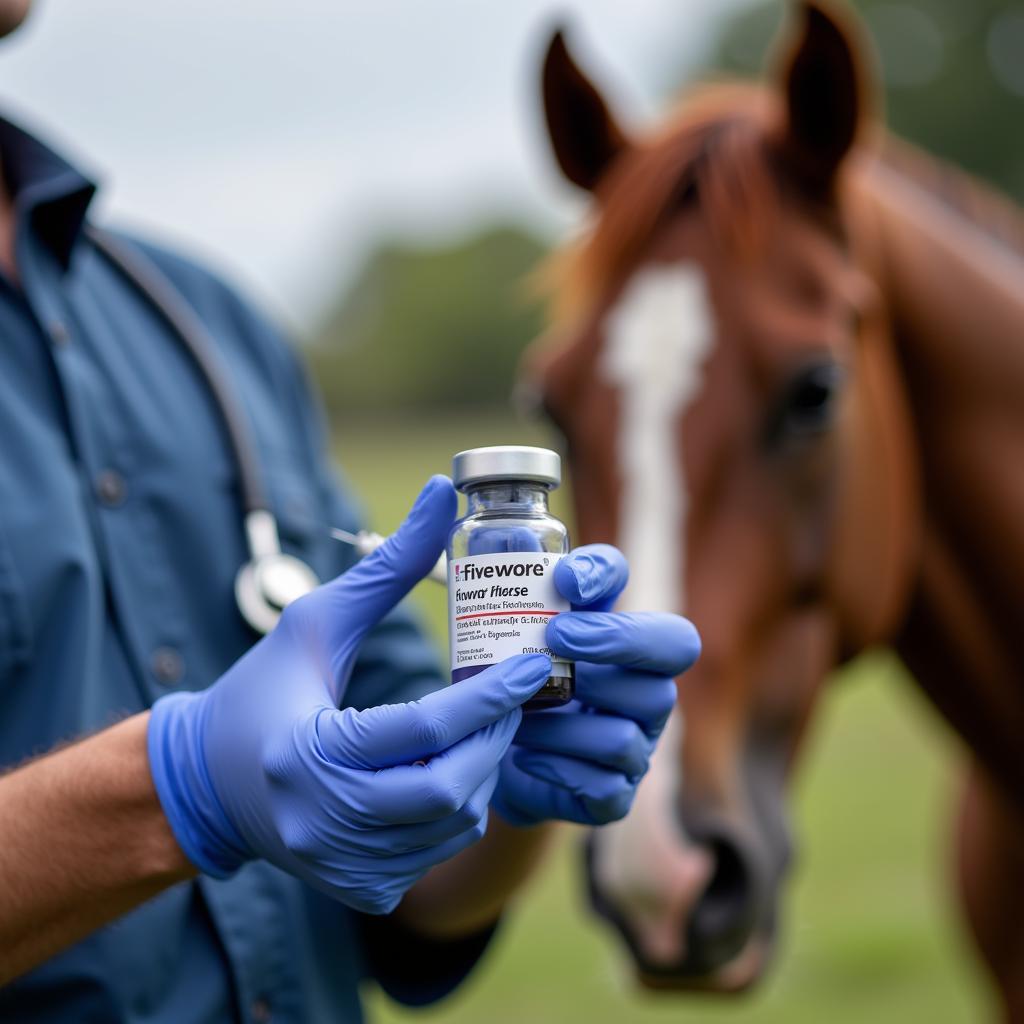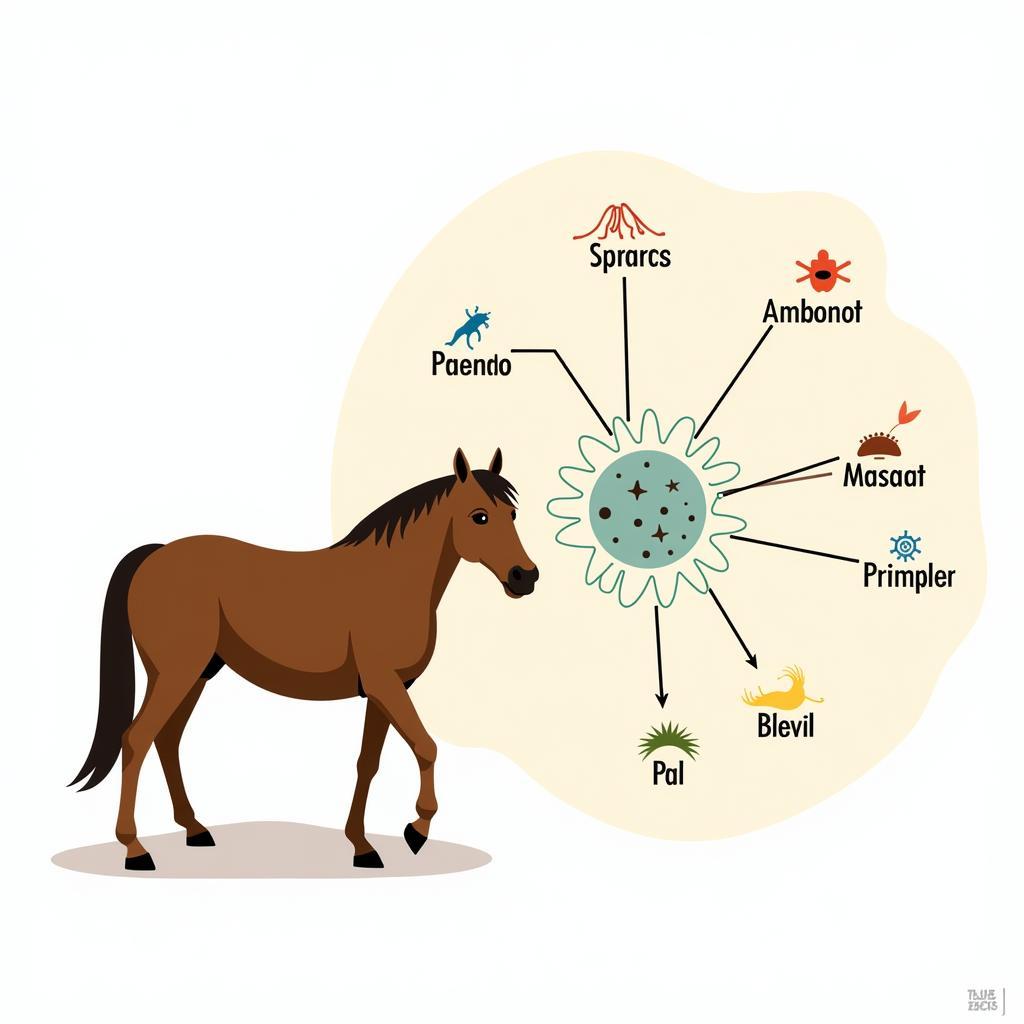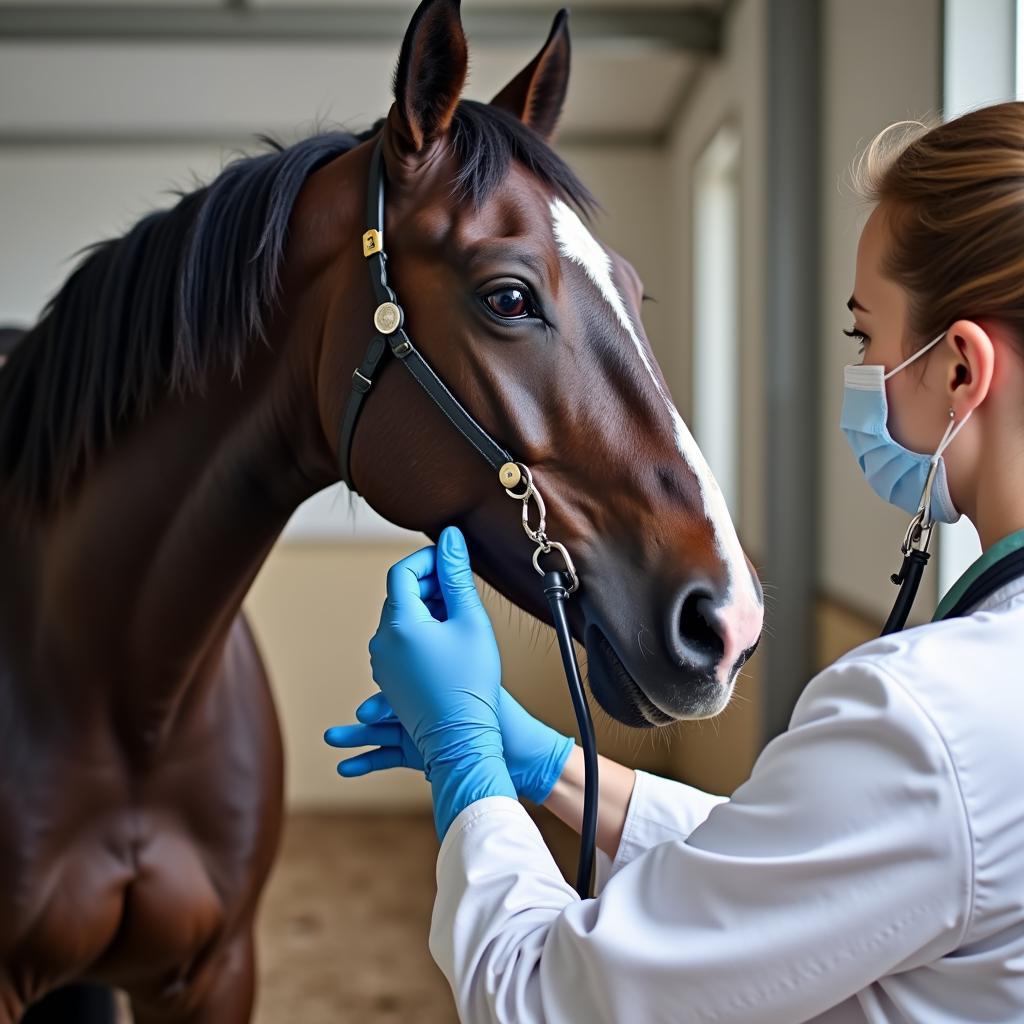The Five Way Horse Vaccine, also known as the 5-in-1 vaccine, is a crucial part of equine healthcare. It protects horses from five deadly diseases: Tetanus, Eastern and Western Equine Encephalomyelitis (EEE/WEE), Equine Influenza, and Rhinopneumonitis (Equine Herpesvirus). This article will delve into the importance of this vaccine, its components, potential side effects, and frequently asked questions to help you make informed decisions about your horse’s health.
 Five Way Horse Vaccine Vial
Five Way Horse Vaccine Vial
Why is the Five Way Horse Vaccine Important?
The five way horse vaccine safeguards your horse from diseases that can cause severe illness, long-term health problems, and even death. These diseases are highly contagious and can spread rapidly through horse populations.
- Tetanus: Caused by a bacteria found in soil, tetanus leads to muscle stiffness, paralysis, and can be fatal.
- Eastern/Western Equine Encephalomyelitis (EEE/WEE): These are viral infections spread by mosquitos, causing inflammation of the brain and spinal cord, often resulting in neurological problems or death.
- Equine Influenza: A highly contagious respiratory virus that causes fever, cough, and nasal discharge, potentially leading to secondary infections.
- Equine Herpesvirus (Rhinopneumonitis): This virus can cause respiratory illness, abortion in pregnant mares, and neurological problems.
Vaccinating your horse not only protects them but also helps prevent the spread of these diseases to other horses.
What’s in the Five Way Horse Vaccine?
The five way horse vaccine is a combination vaccine, meaning it contains multiple antigens to protect against different diseases. It contains inactivated or killed versions of the viruses and toxoids for the bacteria, which stimulate the horse’s immune system to produce antibodies without causing the diseases.
 Equine Immune Response to Vaccination
Equine Immune Response to Vaccination
Five Way Horse Vaccine Schedule
The initial vaccination schedule for the five way vaccine usually involves a primary series of two doses, administered 4-6 weeks apart, starting when the foal is around 4-6 months old. Following the initial series, booster vaccinations are essential to maintain long-term immunity.
5 way vaccine horse are generally recommended annually for most horses. However, horses in high-risk areas or those that travel frequently might need more frequent boosters. Consult with your veterinarian to determine the best vaccination schedule for your horse based on their age, health, and exposure risk.
Possible Side Effects of the Five Way Horse Vaccine
The five way horse vaccine is generally safe, and most horses experience minimal or no side effects. However, like any vaccine, some horses might exhibit mild side effects, such as:
- Swelling and soreness at the injection site: This is the most common side effect and typically resolves within a few days.
- Mild fever: Some horses may develop a low-grade fever for a day or two after vaccination.
- Loss of appetite or lethargy: These are less common side effects and usually temporary.
In rare cases, more serious allergic reactions can occur. These reactions require immediate veterinary attention.
Frequently Asked Questions About the Five Way Horse Vaccine
How effective is the five way horse vaccine?
The five way horse vaccine is highly effective in preventing the diseases it targets. However, no vaccine provides 100% immunity.
What if my horse misses a booster shot?
If your horse misses a booster shot, consult your veterinarian. They will recommend the best course of action, which might involve restarting the vaccination series.
Can the five way vaccine be given with other vaccines?
Yes, the five way vaccine can often be administered alongside other vaccines. Your veterinarian can advise on the appropriate vaccination schedule and combinations.
When to Contact Your Veterinarian
It’s important to contact your veterinarian immediately if your horse exhibits any signs of illness after vaccination or if you have any concerns about their health.
 Veterinarian Examining Horse for Vaccine Reactions
Veterinarian Examining Horse for Vaccine Reactions
Conclusion
The five way horse vaccine is an essential component of responsible horse ownership, providing crucial protection against serious diseases. By understanding its importance, potential side effects, and following your veterinarian’s recommendations, you can contribute to the well-being and longevity of your equine companion.
Remember, maintaining a strong partnership with your veterinarian and adhering to a regular vaccination schedule is key to ensuring your horse’s lifelong health and happiness.
FAQs
1. Can I administer the five way vaccine myself?
No, the five way vaccine should only be administered by a licensed veterinarian.
2. How often does my horse need the 5-way horse vaccine with west nile?
The frequency of booster vaccinations depends on your horse’s risk factors. Consult your veterinarian for personalized advice.
3. What is in the 5 way vaccine for horses?
The five way vaccine contains inactivated or killed versions of the viruses that cause tetanus, EEE, WEE, equine influenza, and rhinopneumonitis.
4. Is there a difference between the five way vaccine and the six way vaccine?
Yes, the six way vaccine includes protection against West Nile Virus in addition to the five diseases covered by the five way vaccine.
5. My horse seems a bit off after vaccination. Is this normal?
Mild side effects like soreness, low fever, or lethargy can occur after vaccination. However, if you’re concerned, contact your veterinarian.
If you have any further questions or need assistance with your horse’s healthcare, our team at Justus Horses USA is here to help. Contact us at:
Phone Number: 0772127271
Email: [email protected]
Address: QGM2+WX2, Vị Trung, Vị Thuỷ, Hậu Giang, Việt Nam.
Our dedicated customer service team is available 24/7 to provide support and answer your queries.